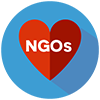
Many aid actors, particularly among governments in developing countries, refer to ‘NGOs’ and their role in international aid and development cooperation. But the phrase ‘NGO’ is contested terminology, and for many has been subsumed within a broader category of ‘civil society organizations’ or ‘CSOs’. This study has chosen to use the term ‘CSO’.
The study uses a definition of CSOs put forward by the 2007–2008 Advisory Group on CSOs and Aid Effectiveness and now adopted by the OECD DAC:
“[CSOs] can be defined to include all non-market and non-state organizations outside of the family in which people organize themselves to pursue shared interests in the public domain. Examples include community-based organizations and village associations, environmental groups, women’s rights groups, farmers’ associations, faith-based organizations, labour unions, co-operatives, professional associations, chambers of commerce, independent research institutes and the not-for-profit media.”
CSOs are voluntary organizations with governance and direction coming from citizens or constituency members, without significant government-controlled participation or representation.
The recent ‘Busan Global Partnership for Effective Development Cooperation’ recognized CSOs as “independent development actors”:
“Civil society organizations (CSOs) play a vital role in enabling people to claim their rights, in promoting rights‐based approaches, in shaping development policies and partnerships, and in overseeing their implementation”
There are many types of CSOs involved in delivering aid, including faith-based groups, trade unions, professional associations, internationally affiliated organizations with branches in many different countries etc. ‘NGO’ is sometimes used interchangeably with ‘CSO’, but NGOs should be properly understood as a subset of CSOs involved in development cooperation, albeit often one with no clear boundaries. Constituency-based organizations, such as trade unions or professional associations, for example, often do not self-identify as NGOs, but rather as CSOs.

In the USA, the term generally used to refer to US CSOs involved in international development and humanitarian assistance is Private Voluntary Organizations (PVOs). According to USAID, a PVO is “a tax exempt, nonprofit organization that solicits and receives case contributions from the general public and conducts or anticipates conducting international programme activities consistent with US Foreign Policy objectives.”
In the USA, the category of CSO sometimes includes for-profit organizations.
International NGOs (INGOs) can be seen as a distinct category among non-state actors, which have been very prominent in development cooperation during the past decade. They constitute a subset of NGOs in which coalitions or families of NGOs, based in various donor and developing countries, have formally associated in an international or global governance structure.
These international structures coordinate their ‘NGO family’ programming at the global level. This characteristic changes the INGO’s relationship with a given donor or public in an individual donor country as these organizations develop, finance and promote programmes across donor countries.
Some well-known examples are World Vision International, CARE International and Save the Children International.
Rather than delve into a debate on the pros and cons of this terminology, which is a reflection of the diversity of non-governmental actors (many of whom are not involved in aid delivery), this study has chosen to use ‘CSOs’ as the most inclusive concept.
CSOs include a diverse set of organizations, ranging from small, informal, community-based organizations to the large, high-profile, INGOs working through local partners across the developing world. Their governance structures are equally varied, a function of their mandate and constituency. However, all share a common characteristic: CSOs, by their very nature, are independent of direct government control and management.
The number of NGOs in the United States is estimated at 1.5 million. Russia has 277,000 NGOs. India is estimated to have had around 2 million NGOs in 2009, just over one NGO per 600 Indians, and many times the number of primary schools and primary health centres in India.
NGOs are difficult to define, and the term ‘NGO’ is not always used consistently. In some countries the term NGO is applied to an organization that in another country would be called an NPO (nonprofit organization), and vice-versa. There are many different classifications of NGO in use. The most common focus is on “orientation” and “level of operation”. An NGO’s orientation refers to the type of activities it takes on. These activities might include human rights, environmental, improving health, or development work. An NGO’s level of operation indicates the scale at which an organization works, such as local, regional, national, or international.
The term “non-governmental organization” was first coined in 1945, when the United Nations (UN) was created. The UN, itself an inter-governmental organization, made it possible for certain approved specialized international non-state agencies — i.e., non-governmental organizations — to be awarded observer status at its assemblies and some of its meetings. Later the term became used more widely. Today, according to the UN, any kind of private organization that is independent from government control can be termed an “NGO”, provided it is not-for-profit, non prevention, and not simply an opposition political party.
One characteristic these diverse organizations share is that their non-profit status means they are not hindered by short-term financial objectives. Accordingly, they are able to devote themselves to issues which occur across longer time horizons, such as climate change, malaria prevention, or a global ban on landmines. Public surveys reveal that NGOs often enjoy a high degree of public trust, which can make them a useful – but not always sufficient – proxy for the concerns of society and stakeholders.
Do you know what is a BANGO? TANGO? DONGO? INGO?
See here: NGOs @ wikipedia




Copyright © 2024 The Olive Tree SAL, all rights reserved. Terms of Use | Privacy Policy